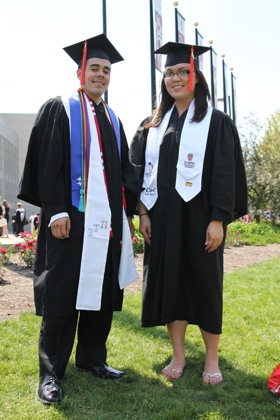With help from Milwaukee company, two engineers graduate with a head start
Two University if Wisconsin–Madison engineering graduates had a head start on promising careers even as they crossed the stage in the May commencement ceremony. Now they will join the ranks of engineers at Rockwell Automation.

Jay Flores and Julia Shaw, shown at graduation, are the first two engineering students to graduate from the Rockwell Automation Diversity Scholars program.
Photo: Mark Riechers
Jay Flores, a mechanical engineering graduate, and Julia Shaw, an industrial and systems engineering alumna, are the first two UW–Madison engineering students to graduate from the Rockwell Automation Diversity Scholars program. The program provides full scholarships and internship opportunities to promising UW–Madison engineering freshmen who are under-represented minorities and who come from one of five Milwaukee public high schools.
During their careers as students, the pair-both graduates of Rufus King High School-had internship opportunities every summer and were able to avoid working during the semester, allowing them to focus on their education and participate heavily in the campus community. And while job offers weren’t part of the original plan, both received them before their senior years were up.
Headquartered in Milwaukee, Rockwell Automation is the world’s largest company dedicated to industrial automation and information.
As an undergraduate, Flores rose through the ranks of the Society of Hispanic Professional Engineers (SHPE) to become its national undergraduate representative and a member of the board of directors. He’s participated heavily in SHPE outreach programs to high schools, educating students about engineering careers and making the UW–Madison campus feel welcoming for incoming Hispanic freshmen.
Now, after a two-week leadership training program for pre-MBA students at Yale University, he will start as a global sales trainee for Rockwell Automation in July, using his engineering expertise to advise customers about their purchases. He says he owes his success-and his realization of what he wanted to do with his engineering major-to his diverse hands-on internships at the company, where his supervisors encouraged him to take on leadership roles.
“The chance to have an internship at such an early age-as a freshman in college — is very rare,” Flores says. “I was actually challenged. Once I demonstrated I was ready to work, my manager was amazing in giving me responsibilities and trusting in my abilities as an engineer.”
Flores, who turned down a job offer from another major local company in favor of staying with Rockwell Automation, says his success, too, will indirectly benefit other Hispanic students with interests in science, technology, engineering and math. He says these students don’t always get a chance to see how they can be successful.
“There are not enough Hispanic leaders out there right now, or they don’t have a big enough voice to make the huge change that needs to happen in our communities,” Flores says. “I want to serve as a role model and increase the number of role models that we have.”
Shaw, meanwhile, will use her industrial and systems engineering degree to lead projects, such as standardizing companies’ processes across different facilities.
Over the course of three summer internships at Rockwell Automation, she made presentations to clients, assisted with assembly line setup, and checked for obsolete parts in the company’s catalog of electrical components.
“It’s good for the industry, it’s good for our customers, and it’s good for the world to have a strong base of engineering talent”
Paul Shane, Rockwell Automation
“The experiences I’ve had with Rockwell Automation made my engineering classes seem more significant to me because I was exposed to some of the things we were talking about in my physics class before I even entered that class,” she says.
The variety of internships, which Shaw was allowed to choose herself, helped her transform her career trajectory from uncertainty to a set of clear goals.
“I came in very open-minded and didn’t know what I wanted to do with an industrial engineering degree. Industrial engineers can do anything-hospitals, manufacturing, fashion,” she says. “Rockwell Automation came in and actually helped me solidify that I liked manufacturing.”
Shaw’s internship opportunities opened up doors. “It made me visible to other companies,” she says. “Many people contacted me with job offers.”
Rockwell Automation had no requirement that Shaw eventually work for the company, however, she accepted a job offer with two more semesters to go.
“My loyalty to Rockwell Automation has stayed true because of their willingness to give me the opportunities I’m looking for,” she says.
Paul Shane, manager of talent acquisition for Rockwell Automation, says the company uses the five-year-old program and others like it to encourage under-represented minorities and women to participate in science, technology, engineering and math fields, remove financial barriers to college, and to sustain those students through graduation.
“It’s good for the industry, it’s good for our customers, and it’s good for the world to have a strong base of engineering talent,” Shane says.
“Historically, in the U.S. engineering has been a very white male-dominated field. Diversity is beyond just race and gender: It goes to different thoughts, geographies and cultures. We want to make sure we’re helping to diversify the whole field,” Shane says.
Enjoy this story?
Read more news from the College of EngineeringTags: College of Engineering, diversity
